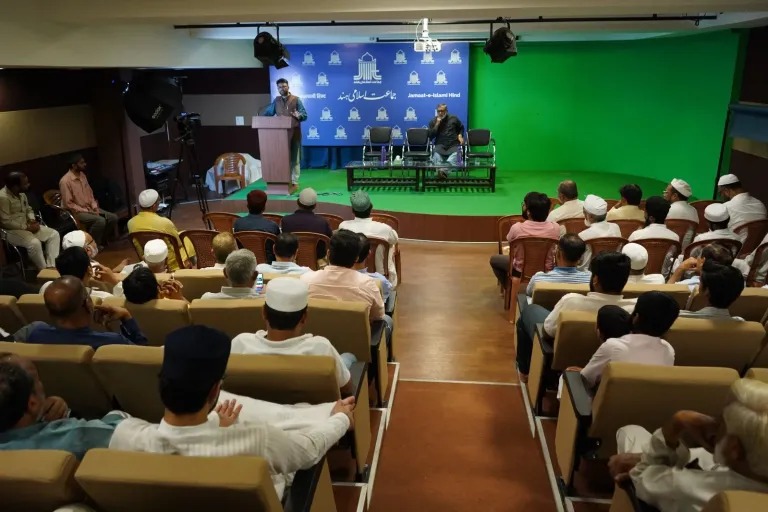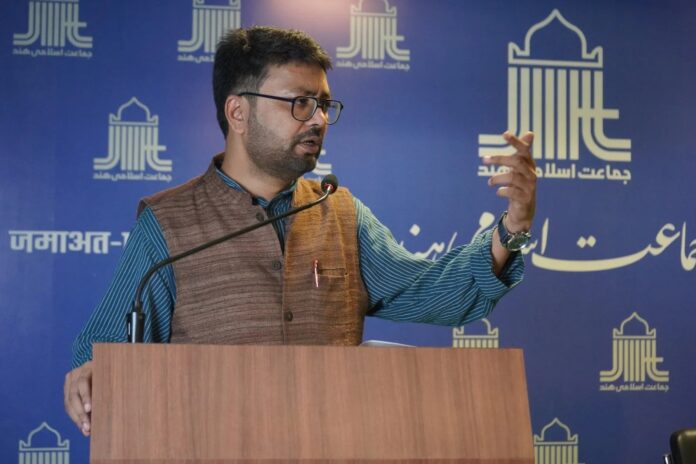By Anwarulhaq Baig
NEW DELHI: Nadeem Khan, national secretary of the Association for Protection of Civil Rights (APCR), has drawn disturbing parallels between the punitive demolition of Muslim homes in BJP-ruled states in India and similar actions in the occupied Palestinian territories by Israel. Speaking at a recent lecture at the headquarters of Jamaat-e-Islami Hind (JIH) here, Khan described these demolitions in India as an “imported method of structured violence.”
Historically, punitive demolitions in India have been rare. Before 2017, there had been no instances of such demolitions since independence, not even during the 2002 Gujarat riots when Prime Minister Narendra Modi was chief minister. Khan pointed out that the concept of demolishing homes as punishment originated in Israel, particularly after the 1967 war when hundreds of Palestinian homes were destroyed. Over the years, thousands of Palestinian homes have been razed under a policy of “immediate justice,” often without due process.
Khan emphasized that the recent uptick in demolitions in India, especially since the BJP came to power in Uttar Pradesh in 2017, mirrors these Israeli practices. He stated that the bulldozer tactics began with the targeting of homes in Shamli district after a beef-related accusation against a Muslim family, leading to the demolition of 68 homes, predominantly belonging to Muslims. He noted that by 2023, over 11,000 police encounters had occurred in Uttar Pradesh, many targeting Muslim individuals.
The spread of this “bulldozer justice” is alarming, according to Khan. After its origin in Uttar Pradesh, similar demolitions took place in Madhya Pradesh, Gujarat, Rajasthan, and Karnataka, often following communal incidents. He cited specific cases, such as the demolition of homes in Khargone and Sendhwa, where communal violence had occurred. In these instances, homes were destroyed shortly after allegations or incidents, frequently without thorough investigation.
Khan also highlighted the case of Javed Mohammed, an activist whose home was demolished overnight after a notice was issued, exemplifying the disregard for legal protocols.
In Haryana, following communal tensions in Nuh, numerous shops owned by Muslims were also demolished. Khan remarked that this pattern extends to various regions, including temporary structures in Jahangirpuri, Delhi, which were destroyed just days after violence erupted there.
Khan reported that since 2017, approximately 1,935 major structures have been demolished across several states under punitive measures, with Uttar Pradesh leading the count. In Madhya Pradesh, around 259 Muslim structures were reported demolished under similar circumstances. Notably, while punitive actions against Muslims proliferated, no comparable demolitions occurred during the tenure of the Congress party, further underscoring the targeted nature of these measures.

The speaker criticized the government’s conflation of punitive demolitions with encroachment removals, noting that many demolitions were inaccurately categorized as such. In many cases, backdated notices were used to create the appearance of due process before demolitions occurred.
Khan asserted that while attention is focused on states like Uttar Pradesh and Madhya Pradesh, Assam has potentially witnessed even more demolitions, though comprehensive data is lacking. He highlighted that in Assam, a significant number of homes have been targeted, particularly in tribal areas, leading to widespread claims of selective punishment against Bengali-speaking communities.
Nadeem Khan’s lecture underscores the troubling implications of “bulldozer justice” in India, drawing unsettling comparisons to Israeli practices in occupied territories. He calls for a critical examination of these actions, which not only contravene the Indian Constitution but also represent a broader trend of systemic violence against specific communities. Khan’s insights highlight the need for greater accountability and adherence to legal norms to protect vulnerable populations from punitive state actions.
The APCR representative pointed out that “bulldozer justice” represents an attack on India’s judicial system, disproportionately impacting Muslims. He noted that many victims of demolitions are later found innocent, undermining the judiciary’s role in protecting rights. Despite petitions against these actions, the Supreme Court has redirected cases back to the High Court, with little progress.
Khan highlighted ongoing issues, including the lack of hearings for cases like that of Javed Mohammed, whose home was demolished over 24 months ago. He described how the Supreme Court raised objections to bulldozer justice during recent hearings, eventually ordering a stay on demolitions until October 1. The Court plans to establish pan-India guidelines to regulate property demolitions.
Khan called for clear procedural steps, including a 30-day notice period and allowing recorded responses from affected parties. He stressed the bravery of petitioners Rashid Khan and Mohammed Hussain in challenging the government. By implementing these guidelines, he argued, punitive demolition actions could be controlled, restoring integrity to the judiciary and protecting vulnerable communities from arbitrary state actions.





